|
|
|
Sort Order |
|
|
|
Items / Page
|
|
|
|
|
|
|
| Srl | Item |
| 1 |
ID:
134047
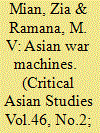

|
|
|
|
|
| Publication |
2014.
|
| Summary/Abstract |
The South Asian security landscape is increasingly dominated by a complex four-way dynamic between India, Pakistan, China, and the United States. The stresses and strains of the relationships between these states directly affect the prospects for peace and prosperity for almost half of humanity. This article describes some of the military contours of this landscape, with a focus on strategic postures, weapon acquisitions, and the role of nuclear weapons. It maps the India-Pakistan arms race over the past decade, the economic constraints on the two states, the role of China and the United States as weapons suppliers, and the risk and consequences for nuclear war. The authors then look at India's relationship with China, which is marked by both cooperation and competition, and the rise of China as a close military, political, and economic ally of Pakistan. While the United States has had long-standing cooperative relationships with both India and Pakistan, these relationships have been undergoing major shifts over the last two decades. U.S. concerns about China's increasing military and economic power have also intensified over this period as well. Of particular significance has been the effort to create a U.S.-India strategic partnership to balance and contain a rising China, which may become a central feature of the emerging global order. This article also offers a brief overview of what is publicly known about the nuclear arsenals of the four countries, ongoing production of weapons-usable fissile materials in Pakistan and India, as well as the race to build longer-range missiles.
|
|
|
|
|
|
|
|
|
|
|
|
|
|
|
|
| 2 |
ID:
134046
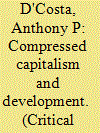

|
|
|
|
|
| Publication |
2014.
|
| Summary/Abstract |
The global capitalist system is at a particular historical juncture with a dilution of the capitalist core away from Western (and Japanese) centers of accumulation to China and India, among other countries. What is the nature of capitalism in these countries? Are China and India going along the same development trajectories that advanced capitalist countries followed earlier? Is their accumulation model the same as that of the OECD economies or is accumulation different under late capitalism? The author argues that capitalism in India and China is "compressed," meaning that the phases of capitalism do not follow one another in sequential order. Instead, some phases, such as primitive accumulation, may be delayed or be experienced at the same time as advanced accumulation under the corporate sector, thereby producing a mode of development that does not generate widespread employment. The author contends that capitalism in India and China is compressed and he demonstrates empirically that primitive accumulation, petty commodity producing sectors, and mature capitalism in late-industrializing countries reinforce each other, creating precarious forms of employment in the process.
|
|
|
|
|
|
|
|
|
|
|
|
|
|
|
|
| 3 |
ID:
134042
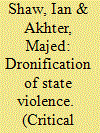

|
|
|
|
|
| Publication |
2014.
|
| Summary/Abstract |
This article explores the shifting methods of U.S. state violence. Building on their earlier work, the authors focus on the use of drones for targeted killings in Pakistan, but here they tease out the wider implications for the future of "warfare"-particularly the meaning and extent of sovereignty and territory. The authors argue that drone strikes both emerge from and feed back into a series of evolutions in the nature of state violence, centered on the intensely bureaucratic and automated delivery of death. This technopolitical transformation, they contend, is underwritten by the abandonment of "thought" and the ascendance of what Hannah Arendt calls an unaccountable "rule by nobody." To build this argument, the authors investigate the institutional conditions of modern-day drone strikes, moving historically and geographically to the birth of the Predator drone and the rise of the CIA in 1980s Afghanistan. By studying nonhuman sources of power, the authors argue that today's planetary manhunt exceeds any direct human control. They conclude by exploring the "individualization" of targeting and its likely consequences for war and law enforcement.
|
|
|
|
|
|
|
|
|
|
|
|
|
|
|
|
| 4 |
ID:
134044


|
|
|
|
|
| Publication |
2014.
|
| Summary/Abstract |
In this article, the authors compare two prominent examples of the East Asian middle-class transnational split family (TSF) form of international migration in which typically the mother accompanies children abroad while the father stays home to economically support the family: the "astronaut families" (taikong) in Hong Kong in the 1990s, and the "geese families" (kir?gi kajok) in South Korea in the 2000s. Many scholars have located the origin of this migration form in shared East Asian cultural values of familism; moreover, what appears to unite these East Asian TSFs is their shared instrumentalism. The authors argue, however, that the construct of cosmopolitanism-in which citizens share a deep-seated interest in membership in the global community of developed, liberal nations-allows for the appreciation of the distinctive characteristics of TSF migration in Hong Kong and South Korea. The authors analyze Hong Kong and South Korea's respective popular media representations of the rise and wane of the TSF migration pattern in order to elaborate on their particular cosmopolitanisms. During the rise period, Hong Kong's migration was a strategy to secure the region's foundational cosmopolitan identity, while South Korea's was motivated by the search for a newfound cosmopolitanism. In the wane period, the authors suggest that Hong Kong and South Korean cosmopolitanisms are converging. First, in both locations people have begun to question how effective sojourn abroad is for either acquiring or securing cosmopolitanism. Second, in both areas people have begun to recognize the possibility of living cosmopolitan lives at home.
|
|
|
|
|
|
|
|
|
|
|
|
|
|
|
|
| 5 |
ID:
134043
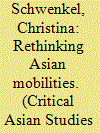

|
|
|
|
|
| Publication |
2014.
|
| Summary/Abstract |
Vietnam's economic reforms have generated much praise for the country's rapid "opening" of its markets, as if the Vietnamese nation had previously existed in a state of isolation, closed to broader global influences and exchanges. Such discourses overlook the importance of transnational circulations of people, goods, technologies, and expertise during the socialist era that were vital to Vietnam's postwar national reconstruction and continue to play a role in post-socialist economic transformation today. This article traces the socialist pathways of labor migration between Vietnam and the former Soviet Bloc (specifically, East Germany) in the 1980s, mobilities that are generally absent in studies of contemporary export labor industries. Based on multi-sited ethnographic and archival research, the author follows Vietnamese workers first to the East German factories where they labored as "contract workers," and then through their subsequent return and reintegration into Vietnamese society after the collapse of the Soviet Union. These mobilities bespeak of an alternative history and formation of diasporic communities that are little acknowledged or addressed in literature on labor migrations, and yet are important to understanding emerging forms of stratification today in Vietnam. Moreover, an analysis of early non-capitalist experiences with overseas labor regimes in the 1980s provides insights into contemporary Vietnamese governance practices that promote-rather uncritically, similar to other "emerging countries" -export labor as a nation-building strategy to reduce endemic poverty and develop a late socialist country.
|
|
|
|
|
|
|
|
|
|
|
|
|
|
|
|
| 6 |
ID:
134045
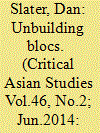

|
|
|
|
|
| Publication |
2014.
|
| Summary/Abstract |
Political blocs and cleavages do not emerge and endure unless political parties construct and cultivate them. When Indonesia democratized in the late 1990s, it appeared that party competition would be characterized by two primary cleavages that had been incubated under Suharto's "New Order": a regime cleavage pitting reformist opponents of the fallen dictatorship against its holdovers, and a religious cleavage distinguishing parties by their views on the proper political role for Islam. Some fifteen years after Suharto's departure, neither a reformist nor a religious bloc exists in Indonesian politics. This is not because reformist and religious themes lack resonance among voters, but because party elites have effectively abandoned cleavage politics by promiscuously sharing power in an all-encompassing party cartel. Party leaders have behaved as if they are more accountable to each other than to their presumptive support blocs, leaving reformist and religious social forces without reliable party champions in national politics. This article traces the origins of Indonesia's "accountability deficit" to the elite deal making that accompanied the formation of the country's first democratic governing coalitions in 1999 and 2001. By promiscuously sharing power across cleavage lines, party leaders fostered voter de-alignment in the 2004 and 2009 elections. This de-alignment has left Indonesian democracy vulnerable to the highly unpredictable politics of individuals rather than the more predictable politics of institutions as the 2014 elections approach, ominously opening the door to populist and anti-system challengers striving to rebuild the political blocs that party elites have recently unbuilt.
|
|
|
|
|
|
|
|
|
|
|
|
|
|
|
|
|
|
|
|
|